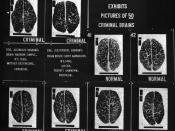THEORIES OF CRIME Uka 5
THEORIES OF CRIME Uka 6
Can I Have Some Theory With That Crime?
Why do individuals commit crimes? Society today is very well concerned with this matter. In todays time, there are psychologists, criminologists, biologists, and sociologists searching for an answer. In reality, the answer to this question is very hard to find out. However, for centuries, researchers of all kinds have been persistent in analyzing criminals for an answer. The scholarly attention to crime from various perspectives has allowed for an extensive range of theories which are based on three broad theoretical approaches of explaining criminal behaviour. These theoretical approaches, which focus on the causes of crime and deviance in modern society, are the biological approach, psychological approach and the sociological approach.
First, the Biological Theory believes that an individuals biology determines if a person becomes a criminal or not. It specifically implies that people are born criminals because of a specific heredity factor different from non-criminals.
The central idea of the Biological Theory states that criminals have a mental and/or physical inferiority which causes them to commit criminal acts. In specific, Lombroso's Theory of Criminal Type categorizes people as potential criminals by the physical characteristics they possess. Lombroso's Theory specifically believes that criminals can be identified through skeletal characteristics such as wide shoulders, crispy hair, flattened nose and so on (Bura, n.d.). Despite the criticism of Lombroso's theory, the majority of biological criminologists agree that the underlying cause of criminal behaviour is believed to be caused by a biological factor. Evidence for supporting this position can be found in the study of twins. Research has found that identical twin pairs tend to share more criminal tendencies than non identical twins suggesting a link between a genetic factor in criminal tendencies. Furthermore, research also...


